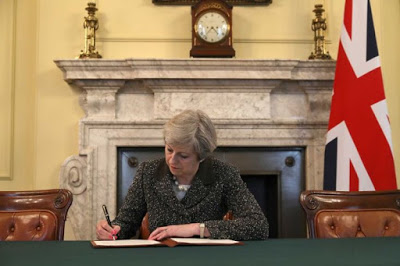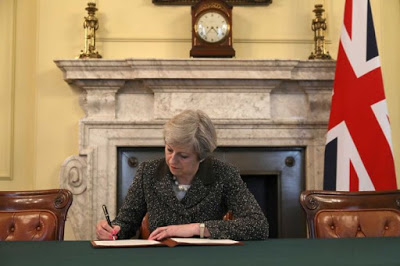A two-year difficult round of negotiations opens today for the United Kingdom, which is beginning the historic process of leaving the European Union.
The announcement of this unique departure in the history of European integration will be made by Prime Minister Theresa May before the deputies in Westminster at 12:30 local time (14.30 Greek time). It is a blow to the European Union that was born from the ashes of World War II, as it celebrates the 60th anniversary of the signing of the Treaty of Rome.
"When I sit down at the negotiating table in the coming months, I will represent all the people of the United Kingdom, young and old, rich and poor […] and yes, the European citizens who have made it their home. the country ", Theresa May will say before the Parliament, at a time when the country remains divided over Brexit, which was elected by 52% of the citizens on June 23, 2016.
"We want to live in a truly global Britain that is leaving the EU and building relationships with old and new allies around the world," she was quoted as saying by the prime minister's office.
The divorce letter will be delivered during the British Prime Minister's speech to European Council President Donald Tusk by the British Ambassador to Brussels, Tim Barrow.
Downing Street published the photo in which Theresa May signs, under the portrait of Robert Walpole, Prime Minister from 1721 to 1742, the letter that is going to change the future of the United Kingdom.
The photo is on the front page of many British newspapers with headlines such as "The eyes of history look at us" for the Times, but also "a leap into the unknown" for the Guardian, reports the Athens News Agency.
"Dear EU, it 's time to leave," writes the Daily Mirror, while euphoria and hilariousness prevail on Europhobic tabloids: "Freedom" is the title of the Daily Mail. "Dover and out", is the inscription on the rocks of Dover that adorns the front page of the Sun.
Are there any entanglements already?
A European diplomatic source explained that when Donald Tusk had the letter in his hands, then Article 50 of the Lisbon Treaty would be considered activated.
The contents of the letter have remained secret as London tries to keep its negotiating arguments secret until the last minute, when talks with the EU-27 will last at least two years. A timetable that seems ambitious in the eyes of analysts to untie ties that have been formed over four decades and given the complexity of the dossiers.
"The truth is that the negotiation process is so huge that two years will not be enough," said Kathryn Barnard, a professor of European law at Cambridge University. "Every stone you lift, others appear."
Camino Mortera-Martίνnez, a researcher at the Center for European Reform in London, also said it was "unlikely" that the negotiations would be completed in two years.
"Especially since there are still blockages before they start," said Patricia Hogwood, a professor of European policy at Westminster University, referring to the bill to be paid on exit or access to the single market.
Theresa May refuses to guarantee the rights of the three million Europeans living in the United Kingdom, when the main goal is to limit immigration from the European Union. Brexit Minister David Davis has hinted that London will not pay the bill presented to it by the European Union, in any case, not in its entirety, for projects to which the United Kingdom is already committed.
According to a European official, the European Commission has estimated this account at 55 to 60 billion euros.
Fears if there is no agreement
In the face of these disagreements and Brussels' desire to send the message that the United Kingdom cannot have the perfect "one foot in and one foot out" agreement with the European Union, not to encourage other countries to follow In London, for example, there is a fear that there will be no agreement. Not at all!
Theresa May assures that she is not afraid of such a development, because "no agreement is better than a bad agreement". But for business circles, this is the worst case scenario, when half of the UK's trade is with the European Union.
The UK economy is currently in good shape: Growth remains stable at 1,8% in 2016 and could reach 2% in 2017. However, with the start of the Brexit process, investment may change destination, while Inflation due to the fall of the pound sterling is already beginning to weigh on household wallets.
Disagreements over the outcome of the referendum vote remain and threaten the territorial integrity of the United Kingdom.
On Saturday, tens of thousands of people demonstrated in London calling on the government to end "this Brexit madness".
In Scotland, MEPs voted in favor of a new independence referendum, with 62% of Scottish citizens voting in favor of staying in the European Union.
Although Theresa May reiterates that "now is not the time", she will hardly be able to ignore this demand that threatens to dismantle the United Kingdom.
The process on dates
The activation
British Ambassador to the EU Tim Barrow is expected to arrive at the European Council building from the British Embassy, close to 14.30pm Greek time, to deliver the letter signed by May informing the country of the country's withdrawal from the Union. In London, May will address parliament.
According to European officials, the letter, addressed to European Council President Donald Tusk, will provide a positive tone for the talks and, in its numerous pages, will summarize the 12 goals that May set in her speech on 17 January.
Session, guidelines, recommendations
Friday, 31 March - Within 48 hours, Tusk will send the draft negotiating guidelines to the other 27 Member States. He will briefly present his views in Malta, where from today, Wednesday, he is expected to participate in a conference of center-right leaders. The 27 envoys to Brussels - Coreper - meet in Brussels to discuss Tusk's draft.
April 11 - EU government advisers - Serpa - from the 27 member states are expected to meet in Brussels to discuss the guidelines. They are expected to meet again on April 24 for further reviews.
27 April - The 27 European Affairs Ministers - General Affairs Council - meet in Luxembourg to prepare for the 27th Summit.
Saturday 29 April - The 27 EU leaders meet in Brussels to agree on guidelines and authorize Michel Barnier as key negotiator.
Tuesday 2 May - Following the May Day holiday, Barnier is likely to send to the Council proposals on how the talks should be structured, seeking the approval of governments.
Instructions
May - The General Affairs Council, without Britain, is convened once again to agree on the legal "negotiating directives" that will bind Barnier and his team. The regular meeting of the Council is scheduled for 16 May but could meet at any date.
The British negotiators, led by Brexit minister David Davis, will sit at the negotiating table with the EU. This may happen shortly after the EU summit on 29 April. Negotiations on all issues will have to wait until EU governments sign the directives but both sides can save time by agreeing on procedural issues - who will meet with whom and where, in what language, etc. - once the relevant order to Barnier. Once the 27 governments have signed the directives, the negotiating teams will begin talks.
The divorce agreement
December 2017: Brussels wants a basic agreement on the Exit Treaty by the end of the year. Key issues: Britain's outstanding financial obligations, the treatment of Britons living in EU countries and Europeans living in Britain, pending legal cases in the EU, the new border regulations.
Transition to the future relationship
2018 - May wants to negotiate a comprehensive free trade agreement. Few consider the two years to be enough for an agreement, and Brussels wants the talks to be delayed until a divorce agreement is reached. However, London and some EU member states may be pushing for parallel trade talks.
October 2018 - This month is Barnier's goal for the finalization of the Exit Treaty, in order to give time for its ratification by the European Parliament and by a majority of the European Council by March 2019.
Fall 2018 to Spring 2019 - Just to make matters worse, the Scottish government wants a referendum on its independence once the Brexit deal is clear. But May has so far rejected a call for a new referendum in Scotland until Britain leaves the EU.
B-Day
March 29, 2019 - Britain leaves. In any case, it should be exactly two years after May sent the Article 50 letter. It happens to be Friday and the last working day of the quarter.
There may be slight changes regarding the date. Britain can leave earlier if it secures an agreement and the two-year deadline can be extended if everyone agrees. But Brussels wants Britain out of the Union before the European elections in May 2019. Although there are threats of disagreement on both sides, few want such chaos.
May and EU leaders say transitional arrangements may be needed to give more time for a future trade agreement to be agreed, as well as more time for citizens and businesses to adapt to the new circumstances. Many see another two to five years after Brexit for a final settlement. If Scotland votes in favor of independence, it will have to wait several more years to negotiate its divorce from London and its possible reintegration into the EU.
Source: newsbeast.gr

